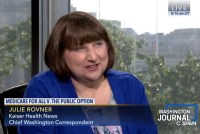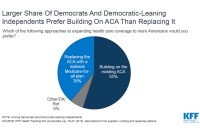Latest KFF Health News Stories
Watch: What Happened To That $500K Dialysis Bill
After journalists investigate, Fresenius, one of the largest dialysis providers in the U.S., has agreed to waive a half-million-dollar bill. Sovereign Valentine, from Plains, Mont., said it’s a “huge relief.”
The Differences Between ‘Medicare For All’ And A Public Option
KHN’s Julie Rovner appears on CSPAN’s Washington Journal Tuesday and compares two key health programs being touted by Democratic presidential candidates: “Medicare for All” and an optional government health plan, often called a public option.
Must-Reads Of The Week From Brianna Labuskes
Newsletter editor Brianna Labuskes wades through hundreds of health care policy stories each week, so you don’t have to.
KHN’s ‘What The Health?’: Deciphering The Democrats’ Health Debate
Health care was a major topic at the Democratic presidential candidate debates in Detroit on Tuesday and Wednesday, but the focus on plan minutiae may have left viewers more confused than edified. Alice Ollstein of Politico, Kimberly Leonard of the Washington Examiner and Caitlin Owens of Axios join KHN’s Julie Rovner to discuss the points made by the candidates plus a series of Trump administration health initiatives on drug prices and hospital shopping.
Biden-Harris Debate Rematch Highlights Health Plan Differences
The Wednesday night event marked the second night in a row for Democratic presidential hopefuls to stake claims on how to fix the health care system.
La revancha del debate Biden-Harris destaca diferencias en los planes de salud
Hay casi tantas versiones de “Medicare para Todos” como candidatos demócratas, y cada uno piensa que su plan es el camino para asegurar a todos los estadounidenses.
In A Messy Democratic Presidential Debate, Facts About ‘Medicare For All’ Get Tossed About
Candidates used their varying views on how to achieve universal coverage — whether through Medicare for All or more incremental steps — as a means to differentiate themselves from the field.
‘If You Like Your Plan, You Can Keep It.’ Biden’s Invokes Obama’s Troubled Claim.
The health policy landscape is very different than it was when Barack Obama made this pledge as part of his pitch for the Affordable Care Act. But the words still might be risky for Democratic presidential primary hopeful Joe Biden.
Democrats Favor Building On ACA Over ‘Medicare For All’
Asked to choose between building on the Affordable Care Act and replacing it with a national Medicare for All plan, 55% of Democrats and Democratic-leaning independents said they would expand the existing law, according to a Kaiser Family Foundation poll released Tuesday.
New Protocol For HIV Prevention Drug Reduces The Number Of Pills Required
Health officials and AIDS advocates in San Francisco have endorsed a new regimen for PrEP medication: to be taken only immediately before and after sex, thus reducing cost and potential side effects. The standard regimen is one pill a day for an open-ended period.
Must-Reads Of The Week From Brianna Labuskes
Newsletter editor Brianna Labuskes wades through hundreds of health care policy stories each week, so you don’t have to.
KHN’s ‘What The Health?’: Cue The Drug Price Debate
Democrats and Republicans on the Senate Finance Committee unveiled their long-awaited proposal to try to rein in prescription drug costs, even as bipartisan leaders of the other Senate committee that oversees health announced it would not bring its drug price bill to the Senate floor until fall. Paige Winfield Cunningham of The Washington Post, Rebecca Adams of CQ Roll Call and Alice Miranda Ollstein of Politico join KHN’s Julie Rovner to discuss this, plus court actions on health issues.
Watch: Out-Of-Network Outrage After A $540K Charge For Dialysis
CBS This Morning covers the highest KHN-NPR Bill of the Month yet: more than half a million dollars for just 14 weeks of kidney dialysis in Montana.
Your Go-To Guide To Decode Medical Bills
Kaiser Health News gives you a user-friendly toolkit to help patients understand some of the ins and outs of medical billing, what to do if you receive a surprise medical bill and things to keep in mind before getting medical care.
¿Quieres retirarte y vivir en el exterior? Medicare no viaja muy bien
De 2012 a 2017, el número de trabajadores jubilados que vivían en países extranjeros y que recibían beneficios del Seguro Social creció casi un 15%, a más de 413,000, según la Administración del Seguro Social.
Federal Suit Alleges ‘Staggering’ Urine Drug Testing Fraud At Tennessee Pain Clinics
Tennessee company’s Medicare billings for urine tests were examined by Kaiser Health News in 2017.
Dream Of Retiring Abroad? The Reality: Medicare Doesn’t Travel Well
More than 400,000 U.S. workers have retired in foreign countries and their ranks are rising. But Medicare doesn’t cover most expenses overseas, so these expats will need to confront the cost of finding alternative insurance.
Biden’s ‘Incremental’ Health Plan Still Would Be A Heavy Lift
The proposal is far from minimal and includes several provisions that Congress has failed repeatedly to enact, including some that were part of the original Affordable Care Act debate.
Must-Reads Of The Week From Brianna Labuskes
Newsletter editor Brianna Labuskes wades through hundreds of health care policy stories each week, so you don’t have to.
KHN’s ‘What The Health?’: Biden Doubles Down On Obamacare
Presidential candidate Joe Biden unveiled a health plan intended to provide a more moderate alternative to his competitors’ “Medicare for All” plans. It would build on the Affordable Care Act but would go much further. Margot Sanger-Katz of The New York Times, Joanne Kenen of Politico and Kimberly Leonard of the Washington Examiner join KHN’s Julie Rovner to discuss this, plus Planned Parenthood’s very bad week, the U.S. House vote to repeal the health law’s “Cadillac tax” on generous health plans, and the reduction in deaths from opioids.





















